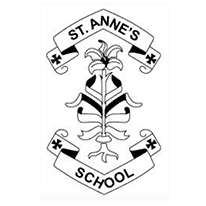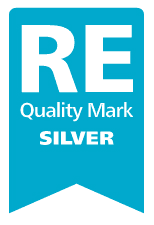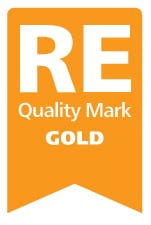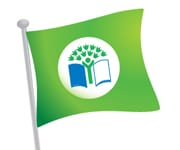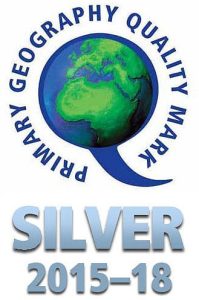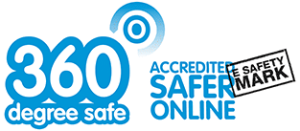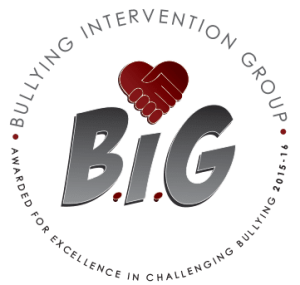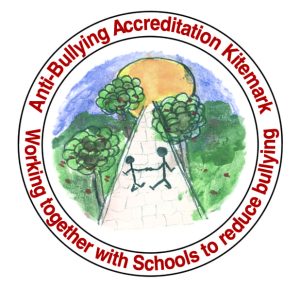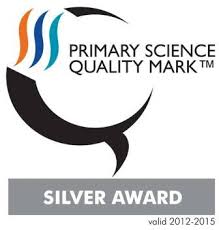Details of our RE Curriculum and how RE is taught
At St Anne’s school, pupils and their families can expect a high-quality religious education (RE) curriculum that is rich and varied, enabling learners to acquire a thorough knowledge and understanding of a range of faiths and world views. We teach according to the Durham Agreed Syllabus.
As a church school, the teaching of Christianity is at the heart of our RE curriculum. Links with our school vision, and support for pupil’s spiritual, moral, social and cultural (SMSC) development are intrinsic to our RE curriculum and have a significant impact on learners. We provide a wide range of opportunities for learners to understand and to make links between the beliefs, practices and value systems of the range of faiths and world views studied.
RE is an academic subject that has a high profile in our school curriculum. It is a priority for senior leaders, who ensure that the teaching, learning and resourcing of RE is comparable with other curriculum subjects.
This means that the RE curriculum:
- is intrinsic to the outworking of our distinctive Christian vision in enabling all pupils to flourish. In addition, it contributes to British values and to pupils’ spiritual, moral, social and cultural development.
- is delivered in an objective, critical and pluralistic manner to engage and challenge all pupils through an exploration of core concepts and questions. Lessons provide meaningful and informed dialogue with a range of religions and worldviews.
- reflects a good balance between the disciplines of theology, philosophy and human science, to enable pupils to develop their religious literacy. (Religious Literacy: Helping children and young people hold balanced and well informed conversations about religion and belief.) (Key Principles of a balanced curriculum in RE.)
- enables pupils to acquire a rich, deep knowledge and understanding of Christian belief and practice, including the ways in which it is unique and diverse, whilst engaging with biblical texts and theological ideas.
- provides opportunities for pupils to understand the role of foundational texts, beliefs, rituals, and practices and how they help to form identity in a range of religions and worldviews.
- supports the development of other curriculum areas and other general educational abilities such as literacy, empathy and the ability to express thoughts, feelings and personal beliefs.
- encompasses the full range of abilities to ensure that all flourish academically, using a wide range of teaching and learning strategies which consider the task, outcome, resource, support and pupil grouping as appropriate to pupils’ needs
- offers tasks that are age appropriate, challenging and sufficiently demanding to stimulate and engage all pupils, whilst extending the most able and providing support for those who need it.
- ensures that all pupils’ contributions are valued in RE as they draw on their own experiences and beliefs
Allocation of time for RE recommended as the minimum entitlement is 36 hours for KS1 and 45 hours for KS2, which approximates to 5% of curriculum time, or roughly one hour per week.
How RE reflects the Church of England Statement for Entitlement for the subject
Religious education should enable every child to flourish and to live life in all its fullness. (John 10:10). It will help educate for dignity and respect encouraging all to live well together. Such an approach is offered through a commitment to generous hospitality, being true to our underpinning faith, but with a deep respect for the integrity of other religious traditions (and worldviews) and for the religious freedom of each person. (Religious Education Statement of Entitlement February 2019)
Religious Education enables children to investigate and reflect on some of the most fundamental questions asked by people. At St. Anne’s C.E. Primary School we develop the children’s knowledge and understanding of the major world faiths, and we address the fundamental questions in life, for example, the meaning of life and the existence of a divine spirit. We enable children to develop a sound knowledge not only of Christianity but also of other religions and non-religious worldviews beyond the six principle religions, providing the foundation for pupils to know about and understand the diversity of beliefs and practices in the world in which we live. Children reflect on what it means to have a faith and to develop their own spiritual knowledge and understanding. As stated in the Church of England Statement of Entitlement for Religious Education, our school aims for all pupils:
- To engage with challenging questions of meaning and purpose raised by human and experience.
- To recognise the concept of religion and its continuing influence on Britain’s cultural heritage and in the lives of individuals and societies in different times, cultures and places.
- To explore their own religious, spiritual and philosophical ways of living, believing and thinking.
- gain and deploy deepening understanding of specialist vocabulary and terms
The teaching of RE underpins the aims of the school: we have a positive, caring ethos founded on Christian beliefs, where all children are valued and respected and encouraged to maximise their potential; every child matters and every success is celebrated; our children will leave us as good citizens, feeling fulfilled, challenged and inspired, and with a solid Christian foundation.
Documents
- Agreed Syllabus for Religious Education in Durham 2020
- RE Curriculum Overview 2021-2022
- St Anne’s Church of England Primary School REQM Letter
- REQM Primary Learner Questionnaire 2019-20
- Pupil Survey Responses and Evaluation Summer 2021
Our Assessment of RE
Assessment and recording
Assessment of children’s progress in RE is ongoing. As a piece of work is completed, it is marked and teachers give written feedback to pupils, often with an opportunity to respond and improve or extend their knowledge or critical analysis. If an opportunity for personal reflection is given, this is not assessed but it is acknowledged. At the end of each unit, children undertake one of a range of formative, age-related assessment tasks or tests. Teachers use this, together with their informal judgements made during lesson observations and marking, to inform their judgement against the benchmark expectations within the syllabus, 2020. Recording of assessment is termly.
Assessment in RE will:
- Be directly related to the expectations of the Durham Agreed Syllabus benchmark expectations.
- Seek to identify development in the different areas of learning in the subject and not only in the acquisition of factual knowledge.
- Recognise the range of skills and attitudes which the subject seeks to develop.
- Employ well defined criteria for marking and assessment which identify progress and achievement as well as effort, following the school’s marking policy.
- Include pupil self-assessment.
- Enable effective tracking of pupil progress to identify areas for development in pupil’s knowledge and understanding, as well as whole school areas for development.
- Enable effective reporting to parents.
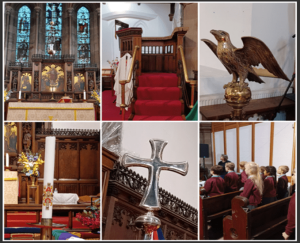 Class 3 Trip to St Anne’s CE Church, Bishop Auckland.
Class 3 Trip to St Anne’s CE Church, Bishop Auckland.
On Wednesday, Class 3 went for a visit to St Anne’s CE Church in the Market Square. They were welcomed by Reverend Matt and Alison who helped them to learn more about the symbols in the Christian church. They started the session with some worship and then went on a ‘Cross Hunt’ to see how many crosses they could find around the church- some people found over 60 crosses!
Next, they taught us about the other objects we see in a Christian church like the lectern, the paschal candle, the altar, the stained glass windows, the font and even the Bishop’s throne.
Reverend Matt explained why different colours are used at certain times of the church’s year and he showed the different vestments of green, red, purple and white. The children’s RE lessons were brought to life by their visit to church and they were a credit to the school.
Well done Class 3!
Accreditations, awards and quality marks
